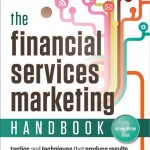Be specific about your advantages, or lose prospects
 It’s hard to stand out among financial firms offering similar services and products. That’s why I agree that you should be specific about your advantages, as suggested by Marie Perruchet in One Perfect Pitch: How to Sell Your Idea, Your Product, Your Business—or Yourself. Learn and share your differentiators.
It’s hard to stand out among financial firms offering similar services and products. That’s why I agree that you should be specific about your advantages, as suggested by Marie Perruchet in One Perfect Pitch: How to Sell Your Idea, Your Product, Your Business—or Yourself. Learn and share your differentiators.
Perruchet says:
A key differentiator should be specific. All customers expect good value, fair prices, excellent customer service, and reliability, to name a few. You are bringing unique value to your market. You solve a unique problem for your customers. That’s the key differentiator.
Find your differentiators
How do you identify your differentiators? While Perruchet’s book is geared to entrepreneurs pitching to investors, some of her questions for uncovering uniqueness can help financial advisors, too. Here are some of them:
- “Remember your last interaction with a client who loves your product. What made him rave about it?”
- “Remember the last time a client, user, or partner told you about your product’s efficiency. What did the person say?”
- “Who is the human resource who stands out and affects your product the most?”
After answering Perruchet’s questions, can you quantify the contribution that your differences make to the results or experience of your clients? If you can, that’s powerful.
Still struggling to find your differentiators? In an email interview with me, Perruchet suggested that you ask your clients why they’ve enjoyed working with you. Ask questions such as, “Why would you recommend me to your friends? Can you tell me of situations where I have really made a difference?” Push your clients to be as specific as possible. Next, share what you’ve learned with your leads to see how well it resonates with them.
Perruchet suggests that you tell a customer story. Create an imaginary character. Walk us through his painful day. Show him experiencing real problems that are solved by your (new) product features. Consider using client testimonials or case studies, if you work in an area of financial services where that’s allowed. Check with your compliance officer to see what’s allowed. However, you’re not likely to have much luck if you’re an investment manager.
Perruchet’s take on advisor mistakes
Knowing that Perruchet has worked with some financial advisors, I asked for her insights specific to that experience. She kindly shared her list of the top mistakes that financial advisors make when pitching to prospects. By the way, I love her tip about trying your pitch on your friends. I suggest a similar technique for testing your writing.
Here’s Marie’s take on advisor mistakes:
Mistake 1. Not simplifying the pitch
Problem: A pitch should be simple enough that the person who hears it can remember and tell it to others in their own words. The leads you pitch to today may not become your clients, but they may have friends who are shopping for a financial advisor and are a perfect fit for you. What should they tell their friends about you? How can you give them the elements to pitch for you to their friends?
Solution: Practice with friends who are not in your field (or co-workers) and ask them for feedback on your pitch (for example, ask if it is clear and specific). Ask them to put your pitch in their words. You will spot the mistakes right away.
Mistake 2. Not discussing specific problems they enjoy resolving for clients
Problem: You need to discuss the main problem you resolve for clients. Generalizations don’t work.
Solution: Give examples as many times as possible and use simple English. For example, do you enjoy working with people who want to buy a house in the next three years, who have moved from a foreign country so they don’t understand the U.S. financial system, or who don’t know how to start saving in their first job out of college? Or maybe you prefer clients who just sold shares of their start-up and don’t know what to do with the proceeds, or who need to start saving for retirement? Be specific so people retain images in their heads. For example, make them visualize their retirement in Palm Springs.
Mistake 3. They have a great 15-minute script, but they don’t do their homework about their leads.
Problem: Your pitch won’t resonate with your prospects if you repeat it by rote or fail to provide situations that are relevant to them.
Solution: Do research about your prospects before you meet them. A great deal of information is available via the internet or social media. Then you can refer to their specific situation. For example, you can say, “as you have a new kid,” or “as you have just changed jobs,” or “as you have just refinanced your home.” When you understand the struggles they face, you can tell them about clients who faced the same and similar situations, and how you helped them. People think they are unique but they are going through universal problems.
Disclosure: I received a free copy of One Perfect Pitch from McGraw-Hill in return for agreeing to write about it. Also, if you click on an Amazon link in this post and then buy something, I will receive a small commission. I link only to books in which I find some value for my blog’s readers.






